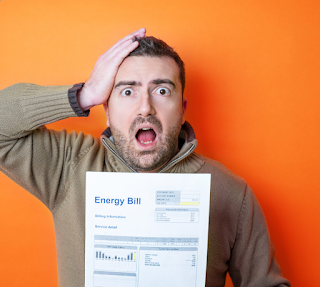Whether you live in a house, manufactured home or your RV, if you pay your own electric, the extreme temperatures and utility company increases can really get under your skin. No matter the state of your current residence you've no doubt noticed increases in your bill. To be fair to the utility companies, much of the electricity we use is within our control to decrease. There are plenty of ways to reduce energy use, and consequently, save money. Some are free, others require an investment. Let's look at a few tips from local electric companies.
No Cost Tips
These simple steps don't cost a thing, but can potentially save you 10 to 25% on your monthly energy bill.
- Turn off lights and appliances when not in use. Don't forget your computer. Most new computers have sleep settings.
- In the winter, open window coverings on the sunny side of your home to take advantage of free heat from the sun. Close the coverings on cloudy days or right after the sun sets.
- In the cooling season, close blinds and drapes during the day to keep heat out.
- In warm months, set the thermostat to 78 to 80 degrees when home and 5 to 10 degrees warmer at night or when you're not home.
- In the cold months, set the thermostat to 68 degrees when home, and then back to 55 to 68 degrees when unoccupied.
- Dress according to the weather
- Barbecue outdoors when practical, keeping in mind the heat and effect of sun on your body.
- Reducing the heat coming into your home from any source, such as cooking, will reduce the load on your air conditioning.
- In a manufactured home or house or if your RV has an aftermarket apartment refrigerator, vacuum your refrigerator coils (underneath and in the back) and don't obstruct the coils. They need air space to work. With any refrigerator, don't keep door open while deciding what you want to eat. Each time the door is opened for too long, all the cold air is let out and needs to start all over to cool again. Make sure food is cool and covered before it goes into the refrigerator. Keep the seals (gaskets) on refrigerators and freezers clean. When choosing an RV site look for one where the RV wall with the refrigerator will be on the east where you get only the lesser morning heat/sun
- Also, use your dishwasher, clothes washer and dryer, and cook as late in the evening as possible. If your dishwasher has a filter, keep it clean. Use the energy saver option on your dishwasher, allowing dishes to air dry.
- Run full loads in your washer and dryer.
- Unplug your televisions/DVD/DVR when you're on vacation. Most new sets draw power even when they're turned off. Same goes for phone and device chargers.
- Keep lights and lighting fixtures clean, especially if you're reducing the number of lights you use. Dirt absorbs light. Let lights cool before cleaning them, and never touch halogen bulbs with your bare hands. The oil from your skin can greatly damage the bulbs. Use a small piece of paper to hold the bulb.
- If your A/C unit is on the ground (central air in a mobile home), keep the area around it clean and free of obstructions to maintain air flow. Close foundation vents in the winter months.
- Set your water heater to 120 degrees.
Low Cost Tips
- Use LED bulbs instead of incandescent ones. Regular bulbs use most of the electricity to generate heat, so use care when changing bulbs.
- Check the seals on your refrigerator and freezer and replace if not tight fitting
- Use reflective material in west/south facing windows, rv supply stores have a material similar to what we use in a vehicle windshield but it comes in an economy roll.
- Use room fans (or ceiling fans) to keep the air moving and reduce the feeling of heat in your home.
- Replace air conditioner filters. Spray the filters with a light coating of lemon furniture polish or vegetable oil cooking spray to help trap dirt in the filter. (This is a new one for me!)
- Of course, look for the shadiest, most treed sites when you move to an RV site.
Added Cost tips
Most of these are in reference to manufactured homes are a bit more cost intensive.
- If you ever get a broken window, consider replacing it with a double paned, dark glass window. You can opt to change out your current windows to these but it's a bit pricey.
- Service your heating and air conditioning systems once a year, replacing them if necessary.
- If you need to replace an old appliance look for products with the ENERGY STAR label. They are more energy efficient.
Keep in mind too that RV's are often less insulated than an manufactured home or a house. So although you may think your bill in an RV should be less, RV's, especially those with less insulation may have HIGHER bills. As Manufactured homes and RVs age the insulation tends to degrade making it less effective.
Hope you were able to take away a few money saving tips from these. If you have any other tips that have been helpful please share them below or on our FB page where you found this article.
Teri Blaschke is the RV Park operator of family operated Hidden Valley RV Park in San Antonio, TX and writer of the park blog “A Little Piece of Country in San Antonio.” Teri contributes to various other blogs with a focus on either travel or social media and how it relates to the outdoor hospitality industry but her passion is serving the RV travel community by providing a memorable RV camping experience and growing the Hidden Valley RV family. Connect with Teri on, Facebook, Twitter@HiddenValleyRV and Instagram at instagram.com/hiddenvalleyteri



No comments:
Post a Comment